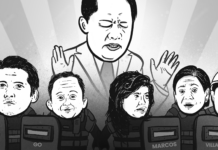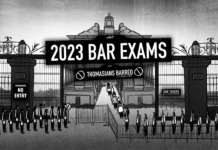IT IS ironic how a university that prides itself as the oldest Catholic university in Asia is also the home of students who are mostly morally selective and apathetic to Catholic teachings and values.
A voter-education survey of the Varsitarian showed that Thomasians consider morality as the most important quality of a candidate for the national elections (39 percent); followed by education (28), government platform (16), and experience (13). Popularity and “endorsements” came out the lowest with one percent each.
However, 48 percent or 653 students of the 1,361 randomly selected respondents for the same survey also answered that they were in favor of “death penalty,” while 39 percent (529 respondents) were not. The remaining 13 percent or 179 respondents had no answer.
A more recent survey showed that Miriam Defensor Santiago and Rodrigo Duterte—candidates who supported the Reproductive Health law and death penalty for drug traffickers—are the top presidential bets of Thomasians while Ferdinand “Bongbong” Marcos Jr.—the heir to the dark and shameful Marcos legacy, and Maria Leonor “Leni” Robredo are statistically tied for the vice-presidency.
The inconsistency between the choices made by Thomasians in these social and political issues, and the Christian values that the University upholds shows that the kind of Catholic education they receive from UST, the Catholic University of the Philippines and the only pontifical university in Asia—is mediocre and even shallow.
The moral laxity and Christian mediocrity of Thomasians and of Filipino Catholic youth in general is a sad reality in today’s society. Most people of this “new” generation have “morally justified” violations of traditionally held moral beliefs, such as those against gay marriage, pre-marital sex, contraception and abortion.
More alarmingly perhaps, while young Filipinos are liberal with sexual morality and condone contraception and even abortion, which is killing, they go for harsh capital punishment, easily abandoning the Catholic Church’s pro-life advocacy “from womb to tomb.”
It has been a common notion among the youth to condone immoral actions so as to promote equality and justice among all, using collective benefits as justification. After all, they could always argue that what is moral for one might be immoral for another. In short, they don’t have any notion of moral absolutes. The only absolute rule for them is relativism.
Beyond board-exam results and international rankings, the true measure of Thomasian education should be how well the students uphold the core values of UST—competence, commitment, and compassion—and foundational Catholic teachings on the sanctity of life and on truth and justice.
If most Thomasians are pro-death penalty, they fail to practice compassion and ignore Catholic teachings on truth and justice, since they ignore the fact that capital punishment in the Philippines has been meted out mostly to the poor; and that it is a cruel and inhumane punishment.
It is ironic for one that UST students should choose the death penalty overwhelmingly on the year chosen by Pope Francis, a recent UST visitor, as the Extraordinary Jubilee of Mercy.
It is said that UST has the most extensive program for theological instruction for undergraduates in all of the Philippines. But what good is having an extensive theological curriculum when UST students do not seem to know, much less appreciate, the Church’s highly strong but very nuanced stand on moral and social issues?
Capital punishment has no moral value. It is not a proper corrective measure for it kills a person who can still be reformed. It does not foster positive change but instead instills fear—naked fear—among the citizenry.
And if Thomasians observe the values of truth and justice, why should they even consider Bongbong Marcos as vice-president? The young Marcos is heir to the Marcos legacy whose depredation and corruption he has never condemned. Thomasians even ignore the fact that the Marcos dictatorship led to killings and widespread suppression of human rights and fostered the corruption and mismanagement that continue to bedevil the nation at present.
If Thomasians look the other way when confronted with the killings and corruption of the Marcos dictatorship; if they support politicians from the dark past or those who condone contraception or abortion in the name of “reproductive rights”—and those who campaign against the Christian values of life and family—and who have merely a “cafeteria” commitment to Church teachings and standards, then UST should just junk its theology and history classes and its community-development activities.
UST should be the first to instill Catholic values upon its students and promote the dignity of the human person. Its pride should rest upon students who go outside its walls as smart, responsible, upright, and compassionate individuals.
More than the experience and educational background, Thomasians should look at the values and positions of the candidates on Catholic issues. They should demand clear explanations on how these candidates position themselves with issues such as divorce, same-sex marriage, and death penalty.
UST should not prioritize measuring its growth through quality rankings or surveys. Rather, it should be more faithful to its core Catholic identity and its vision-mission as well as the titles and honorifics it so proudly puts before its name (“pontifical” and “Catholic”) by ensuring that its values are forever inculcated in every graduate that it produces.
The University should rethink its priorities now more than ever, especially since the world is in the midst of rapid modernization, with people tolerating violations of sacrosanct values, with the youth no longer able to tell the difference between good and bad, between morality and immorality, between what should be condoned and what should be condemned. That is why the University should shine as the light to guide the young, and remain true to its roots and the original charism of its founders.














ever heard of academic freedom?
ever heard why it’s called a university and not a church?
ever heard of hegel’s dialectical materialism?
To the author of this editorial. Please take note that the Catholic Church neither supports nor exclude Death Penalty.
Our only concern is that with the substandard system of justice in this country, the court will be condemning many innocent people to death.
Yours truly,
Bro. Mihkael Ferrer
http://www.vatican.va/archive/ccc_css/archive/catechism/p3s2c2a5.htm
I agree with you, and I am sure many do not agree with you. So what do we do now? What concrete steps do you plan to indertake to combat this moral relativism? If you have any plans and are open to collaboration, let me know and I would like to be part of it. I have a couple of months more in the US, after my doctoral program in International psychology I will be going home.
Fr. John Era, CM
I am a Thomasian student and yes, I agree morality is the most important, yet I am also okay with the death penalty. Why? If you were to find a criminal so evil that even jail or any other “normal” punishments could not stop him from killing a civilian or raping a woman, then I believe it might be better to not have him here at all. WE would be the one then to commit a mortal sin, yes, but to ALLOW this man to commit MORE sins to everyone else, wouldn’t sacrificing this person to protect everyone else be a better choice? It’s not just killing a man, it’s protecting the civilians. Are you not tired of people taking the law so lightly? In our country, we have no discipline, people break the rules every second of every day, and this is to make a statement that “Hey, if you do not follow the law, there will be consequences. we are SERIOUS.” COMMON GOOD, that is what we’re trying to achieve. A friend (who was against the death penalty) asked me a question, “What if the one on trial is innocent? What if that person was your friend, relative, or family member? How would that make you feel?” I guess a lot of people take death penalty so lightly because it’s not THEIR lives that are affected, I cannot imagine the pain if that were to be my parents up there, but call me cruel and heartless, if they were truly guilty, then it is for better of many than for my personal reasons. On the other hand, if an innocent person would be put to death, and even after countless of trials, they were still found guilty, then their lives would not be in vain, because other REAL criminals would become afraid, then minimizing crime rates. Of course the death penalty should be very carefully be implemented to avoid this type of case, such as through honest and fair trials, warnings or time limits to rehabilitate the criminals.
Another thing I would like to talk about is the article hating on Bongbong Marcos. Number one, is Bongbong the one who implemented the martial law? Is he the one who became president those years ago? Is he Ferdinand Marcos?? No, he is not. How are we to say that Bongbong will be the same as his father? Just because he’s his son? Just because they are related we have to blame him for the injustice of his family? Here’s the thing with people, we always look at the negatives over the positives. How would you feel if for example your brother is a known drug lord then all your friends would stop talking to you even if you are innocent? We cannot ASSUME that Bongbong will do the same, or be the same, because THEY ARE NOT THE SAME PERSON, and I believe it is only fair to show compassion and give him a chance to prove that he can be a leader that can help the people of our country.